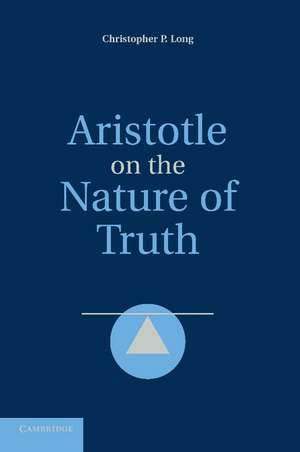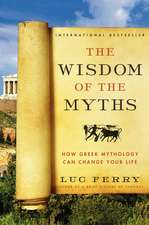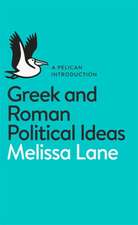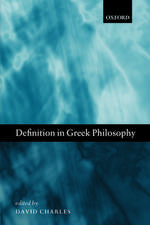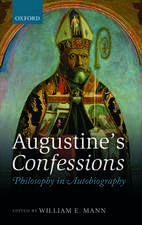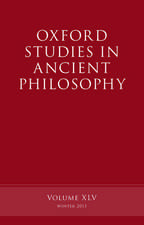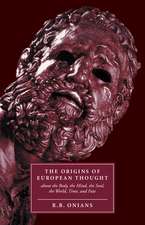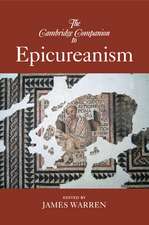Aristotle on the Nature of Truth
Autor Christopher P. Longen Limba Engleză Paperback – 18 sep 2013
| Toate formatele și edițiile | Preț | Express |
|---|---|---|
| Paperback (1) | 337.07 lei 6-8 săpt. | |
| Cambridge University Press – 18 sep 2013 | 337.07 lei 6-8 săpt. | |
| Hardback (1) | 694.04 lei 6-8 săpt. | |
| Cambridge University Press – 21 noi 2010 | 694.04 lei 6-8 săpt. |
Preț: 337.07 lei
Nou
Puncte Express: 506
Preț estimativ în valută:
64.50€ • 66.64$ • 53.66£
64.50€ • 66.64$ • 53.66£
Carte tipărită la comandă
Livrare economică 19 martie-02 aprilie
Preluare comenzi: 021 569.72.76
Specificații
ISBN-13: 9781107670723
ISBN-10: 1107670721
Pagini: 292
Ilustrații: black & white illustrations
Dimensiuni: 152 x 229 x 17 mm
Greutate: 0.43 kg
Editura: Cambridge University Press
Colecția Cambridge University Press
Locul publicării:New York, United States
ISBN-10: 1107670721
Pagini: 292
Ilustrații: black & white illustrations
Dimensiuni: 152 x 229 x 17 mm
Greutate: 0.43 kg
Editura: Cambridge University Press
Colecția Cambridge University Press
Locul publicării:New York, United States
Cuprins
Prolegomenon; 1. The saying of things; 2. A history of truth as cor-respondence; 3. Saving the things said; 4. By way of address: lending voice to things; 5. By way of response: the logic of cooperative encounter; 6. The truth of nature and the nature of truth in Aristotle; 7. On saying the beautiful in light of the good; 8. Ecological justice and the ethics of truth.
Recenzii
'An original interpretation of Aristotle that subtly weaves together the themes of truth and justice. Christopher Long shows how the question of truth leads us ineluctably to justice and the question of justice leads us back to truth. He combines a rigorous reading of Aristotle's texts with an imaginative discussion of how American pragmatic naturalism and Heideggerian phenomenology illuminate Aristotle's attentive response to the world. Through Long's rich text, we can virtually hear Aristotle's voice speaking to us in new, relevant, and exciting ways.' Richard J. Bernstein, New School for Social Research
'Christopher Long's new book, Aristotle [on] the Nature of Truth, is a remarkably fresh and original treatment of one of the most central topics in all of philosophy. Long shows through penetrating and persuasive scholarship that for Aristotle the question of truth is about the nature of things and the things of nature. Thus, this is as much a book about nature and about ecology as it is about truth and being, and it is an indispensable tool for those whose work in environmental philosophy is committed to mining the tradition in order to retrieve a theoretical basis for a new sense of ecological justice. Long philosophizes with a remarkable gracefulness and he has a unique ability to work across methodological traditions to offer a reading of Aristotle that draws resources equally from phenomenology, pragmatism, and analytic philosophy. This book will contribute a great deal to overcoming the polarization that inhibits the usual philosophical approaches to ancient Greek philosophy.' Walter A. Brogan, Villanova University
'This is a boldly conceived, painstakingly researched, and exquisitely executed work. The author's intensely focused attention on the relevant texts is matched by a hermeneutic sensibility animated by imagination, probity, and a steadying awareness of Aristotle's principal preoccupations and commitments. Christopher Long exemplifies what he takes to be at the heart of Aristotle's understanding of truth - responsibility in the sense of responsiveness (including reflexive responsiveness). His reading of Aristotle as an integral part of philosophical naturalism, taken to be a living philosophical tradition, is just one of the notable and valuable aspects of this unique contribution to contemporary philosophy, not just contemporary scholarship. At every turn, Professor Long shows in detail the relevance of Aristotle's writings - indeed, the force of his arguments and the depth of his insights.' Vincent Colapietro, Pennsylvania State University
'This is a deeply insightful, genuinely important book that says things far beyond what its title might suggest. It is at once a learned and original study of Aristotle and his contemporary importance; a brilliant and productive dialogue with naturalism, pragmatism, and existential phenomenology; and a profound and moving meditation on truth, nature, and justice. Aristotle [on] the Nature of Truth is philosophy at its best.' John J. Stuhr, Emory University
'Christopher Long's new book, Aristotle [on] the Nature of Truth, is a remarkably fresh and original treatment of one of the most central topics in all of philosophy. Long shows through penetrating and persuasive scholarship that for Aristotle the question of truth is about the nature of things and the things of nature. Thus, this is as much a book about nature and about ecology as it is about truth and being, and it is an indispensable tool for those whose work in environmental philosophy is committed to mining the tradition in order to retrieve a theoretical basis for a new sense of ecological justice. Long philosophizes with a remarkable gracefulness and he has a unique ability to work across methodological traditions to offer a reading of Aristotle that draws resources equally from phenomenology, pragmatism, and analytic philosophy. This book will contribute a great deal to overcoming the polarization that inhibits the usual philosophical approaches to ancient Greek philosophy.' Walter A. Brogan, Villanova University
'This is a boldly conceived, painstakingly researched, and exquisitely executed work. The author's intensely focused attention on the relevant texts is matched by a hermeneutic sensibility animated by imagination, probity, and a steadying awareness of Aristotle's principal preoccupations and commitments. Christopher Long exemplifies what he takes to be at the heart of Aristotle's understanding of truth - responsibility in the sense of responsiveness (including reflexive responsiveness). His reading of Aristotle as an integral part of philosophical naturalism, taken to be a living philosophical tradition, is just one of the notable and valuable aspects of this unique contribution to contemporary philosophy, not just contemporary scholarship. At every turn, Professor Long shows in detail the relevance of Aristotle's writings - indeed, the force of his arguments and the depth of his insights.' Vincent Colapietro, Pennsylvania State University
'This is a deeply insightful, genuinely important book that says things far beyond what its title might suggest. It is at once a learned and original study of Aristotle and his contemporary importance; a brilliant and productive dialogue with naturalism, pragmatism, and existential phenomenology; and a profound and moving meditation on truth, nature, and justice. Aristotle [on] the Nature of Truth is philosophy at its best.' John J. Stuhr, Emory University
Notă biografică
Descriere
Articulates the nature of truth as a co-operative activity between human beings and the natural world.
